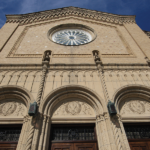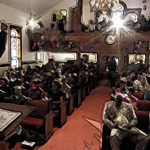WASHINGTON (RNS)—A recent study reporting white Americans without college degrees are dropping out of church faster than their higher-educated counterparts has several possible explanations, researchers said.
The study, by University of Virginia sociologist W. Bradford Wilcox, found that since the 1970s, white Americans with no more than a high school diploma left the pews twice as fast as other Americans.
Other research has connected higher education levels with lower religious belief, and less attraction to literal interpretations of the Bible. People with more education, the theory goes, are more skeptical of religious claims.
But when it comes to religious behavior, college-educated whites seem to have more time, money and motivation to attend religious services, Wilcox said. In other words, lower-educated people may have to work weekend shifts, can't afford to spend money on gas—or feel as if they have nothing to place in the collection plate.
His study, "No Money, No Honey, No Church: The Deinstitutionalization of Religious Life Among the White Working Class," was presented at the annual meeting of the American Sociological Association in Las Vegas.
Wilcox noted he focused on white churchgoers because African-Americans and Latinos don't have the same kinds of education disparities. Researchers haven't examined possible regional differences yet or which denominations have been hit hardest by the trend.
Using data from the General Social Survey and the National Survey of Family Growth, Wilcox found an across-the-board drop since the 1970s in those who attend religious services at least once a month:
• Among college-educated whites between ages 25 and 44, attendance slipped from 51 percent to 46 percent.
• Among moderately educated whites, attendance dropped from 50 percent to 37 percent.
• Among the least educated, attendance fell the most, from 38 percent to 23 percent.
His findings are consistent with the conclusions recently reached by University of Nebraska sociologist Philip Schwadel, who also examined survey data. Schwadel's study, published in the Review of Religious Research, found that with each additional year of education, the likelihood of attending religious services increased 15 percent, and the likelihood of occasional Bible reading increased by 9 percent.















We seek to connect God’s story and God’s people around the world. To learn more about God’s story, click here.
Send comments and feedback to Eric Black, our editor. For comments to be published, please specify “letter to the editor.” Maximum length for publication is 300 words.